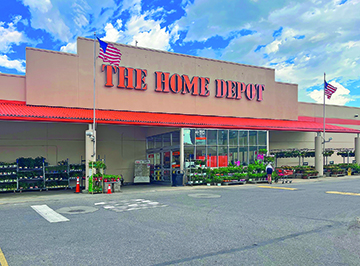by Jessica Hughes

Fired: Santino Burrola was fired in early July for capturing three men on video stealing loads of laundry detergent.
Crime in retail stores is on the rise, not just in Colorado, but across the nation. According to the National Retail Federation’s annual survey, retailers saw an average shrink rate of 1.4% in 2021, which is consistent with the five-year average of 1.5%. But while overall shrinkage, which accounts for employee theft as well, wasn’t up, retailers cited a 26.5% increase, on average, in organized retail crime, plus 80% claimed an increase in violent or aggressive incidents.
“We have seen an increase in retail crime overall,” says Chris Howes, President of the Colorado Retail Council. “We are approaching losses of $75 billion across the country in retail theft, and losses of $1billion a year in Colorado.”
But these incidents aren’t being carried out by teenagers stealing a pack of gum, but rather large groups of individuals that are part of a larger crime network. The Colorado Retail Council organization represents the largest chain retail companies such as Home Depot and Target. And a large part of the organization’s job is to go after the hard-core thieves, not just shoplifters.
“Shoplifting is theft for own personal use. Organized retail crime is groups of individuals stealing products to turn into cash or drugs.” Items that are the most susceptible to theft are those that can easily be resold and that are in high demand on the streets.
“The other troubling thing is the violence we see against employees, customers, and our team members at our retail stores,” said Howes. He cites instances where thieves have used bear spray.
“Some people have seen thieves put their hands right in the cash register and take the cash,” said Howes. “If cops don’t show up within a few minutes, what do you do?”

Home Depot: Like many retailers, Home Depot Inc., pictured here in Glendale, is locked in a struggle to combat inventory “shrink” caused by theft and organized retail crime.
Due to the increase in violent thefts, Howes recognizes the changes that need to be made to safety measures for employees and customers. “We cannot expect the employees to use force against thieves,” says Howes. So, to combat this, many larger retail stores bring in off-duty police offers to stand at the entrance or some sort of private security at the store.
Other changes “shoppers are now seeing everyday items like toothpaste and dish soap behind lock and key,” the National Retail Federation wrote in a statement written in June 2023 about the rise of organized retail crime and effect on public safety.
Despite putting a few of these safety measures in place, safety is still an issue, so much so that employees have felt compelled to stop these thieves in action. But the real crime seems to be employees getting fired over trying to help stop the theft.
In the past few months, there have been several local instances in the Denver metro area where employees were fired for confronting a thief. In July 2023, an Arapahoe County King Soopers employee, Santino Burrola, was fired for capturing three men on video stealing $500 worth of laundry detergent — a common crime that has caught the headlines of even New York Magazine back in 2013.
But the real head scratcher is the termination of the employee. The reason he was fired? It is against Kroger policy for employees to chase after or intervene with theft.
This also comes on the heels of another similar incident where two Atlanta-area Lululemon employees were fired for confronting shoplifters in the store. CEO Calvin McDonald defends the company’s decision to do so by stating the store’s strict safety-first policy.
The common thread throughout these events, the company staking claim in employee and customer safety first, above prosecution of theft.

Theft Numbers: The Colorado Retail Council says that the U.S. is approaching losses of $75 billion across the country in retail theft.
While this seems to be a national trend, Colorado has seen a rise in employees standing up against theft as well. “We’re seeing this happening more and more, employees taking action, although nothing like that in Glendale,” said William J. Haskins, Glendale’s Chief of Police.
“Theft is very much on the rise, but the actual shoplifting numbers are down because stores often times choose not to prosecute,” said Haskins. “Many of the times, stores will only file a trespassing charge vs. charging them with theft.”
Combined with the downgrade of charges and the discouragement from employers to stop theft, it’s starting to become clear why retail theft is on the rise.
Haskins says he’s seeing this across the board at the city’s larger retail stores such as Target and Home Depot. “We have seen more strict corporate policy that prohibits and discourages employees from trying to intervene during a theft.”
Haskins doesn’t believe this is the way to deal with this issue. “We have an obligation to prevent this lawlessness,” said Haskins.
In Colorado, there has also been a pattern of legislation over the past years that have reduced penalties on crime and have negatively affected the court’s ability to go after these thieves. This includes House Bill 16-1104, passed in 2016, that states a defendant will be served a summons vs. a warrant for a petty offense or misdemeanor to avoid having an arrest on their record.
“Those prosecuted now face lower penalties. Instead of jailtime, a fine is enforced but even then, there’s no penalty for them if they don’t pay their fines,” says Haskins. “The worst we can do is to go through a collection agency.”
So, aside from what’s being done at the store level to prevent and stop violent theft, what is being done at the state and federal level? Last year, the Colorado Attorney General Phil Weiser created a statewide task force which plans to combat retail theft, which went into effect January 1, 2023.
And because many thieves try to sell stolen merchandise through online shopping platforms for profit and to avoid prosecution, the Inform Act was introduced in 2021, which requires online marketplaces to collect, verify, and disclose certain information from high-volume third-party sellers, according to Congress.gov.
For now we will have to wait and see if all these efforts will have a positive effect on organized retail crime in Colorado and across the country.
